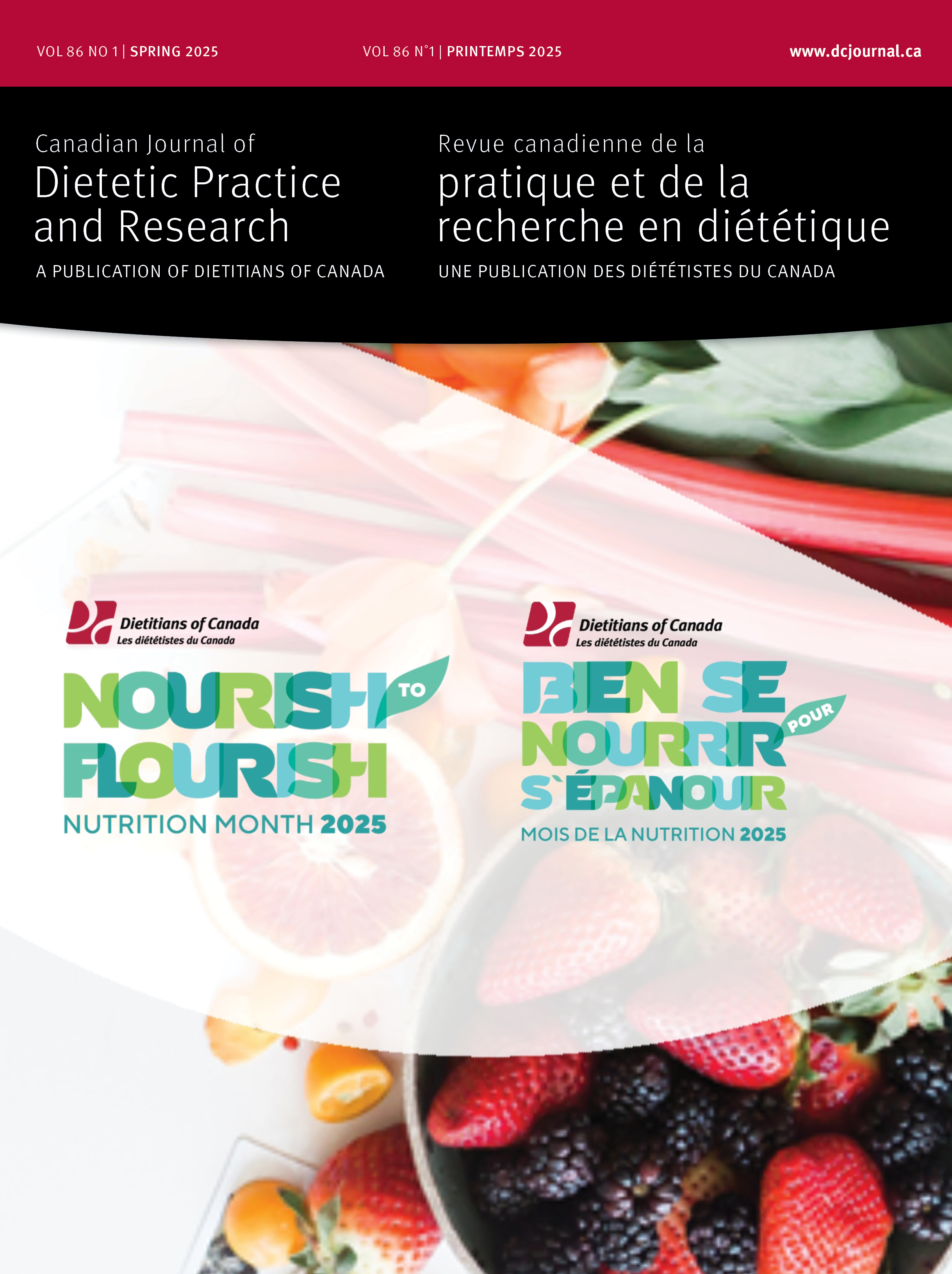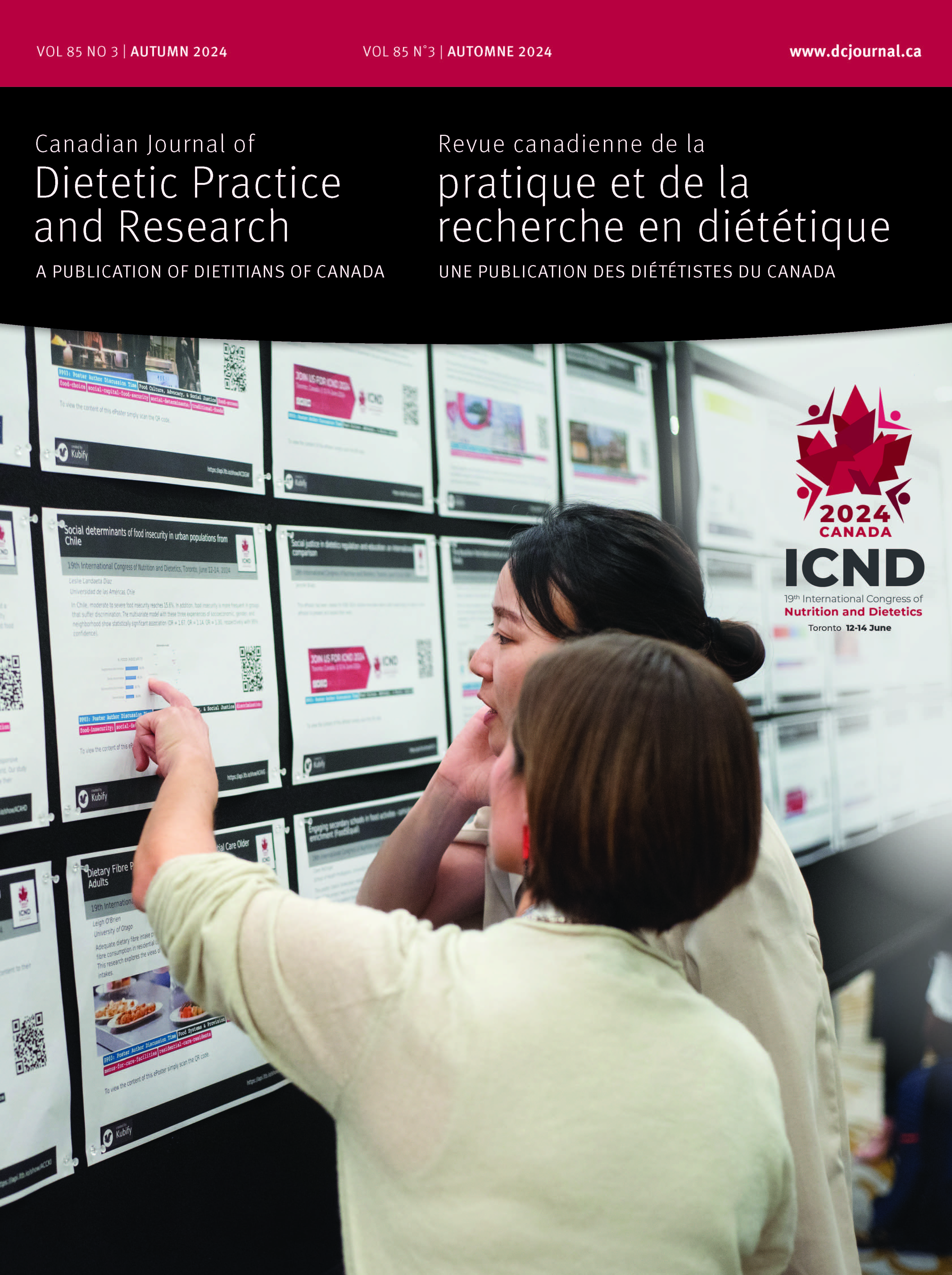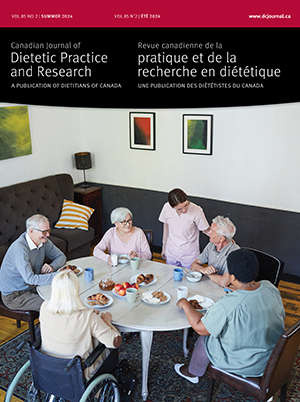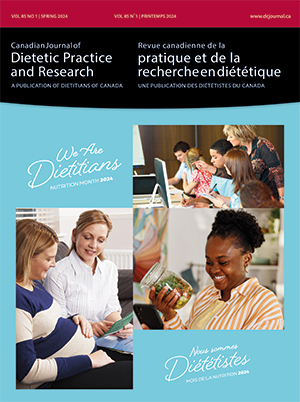Volume 65 • Number 2 • July 2004
Chair’s Message
Research
The British Columbia Nutrition Survey was the last of ten provincial nutrition surveys completed between 1988 and 1999. A qualitative process evaluation was conducted to identify strengths and weaknesses of British Columbia Nutrition Survey procedures, as perceived by 27 public health nurses and dietitians directly involved in data collection. Data for the process evaluation were collected through in-depth telephone interviews, during which interviewers and facilitators described their experiences working for the survey. Qualitative analysis of interview transcripts identified codes that were then organized into eight categories, including issues arising from interviewer and facilitator training, challenges in recruiting survey participants, reflections on safety for survey personnel and participants, facilitators’ key role, the flexibility required to implement the protocol, and communication within the survey research team. Two final categories related to rewarding aspects of the job: insights affecting professional practice, and meeting survey participants and personnel. Evaluation findings show the importance of establishing open communication between research planners and those conducting surveys. This communication is needed to ensure that workers’ needs are met, the quality of the study is maximized, and evaluations of study protocols include the perspectives of those directly involved in data collection.
Greens+® is a popular natural health product marketed as energy-enhancing; however, no objective data substantiate this claim. The study objective was to determine if ingestion of greens+® 1. increases vitality, energy, and perception of wellbeing; 2. increases overall mental health and general health, and 3. decreases the incidence of colds and flus in an otherwise healthy female population. A total of 105 women were enrolled in this 12-week, randomized, double-blind, placebo-controlled clinical trial; 63 (60%) completed the treatment protocol. Both treatment and placebo groups showed a significant time trend effect, scoring better on all outcome measures as the trial progressed. Compared with the placebo group, the greens+® group scored marginally higher on vitality, the primary outcome measure (p=0.055), and significantly higher on energy (a secondary outcome measure, p=0.018). Findings were based on repeated measures analysis of variance; baseline scores were used as covariates. Although a trend toward greater improvement in the greens+® group was noted in the other secondary outcome measures, this trend did not reach statistical significance. Overall, our findings were positive but not conclusive that greens+® increases vitality and energy. These results provide justification for further study of the effects of greens+®.
Perspectives in Practice
To evaluate the impact of the Calgary Health Region Collective Kitchen Program on various Population Health Promotion Model health determinants, data were collected through mail-in questionnaires that examined the members’ (n=331) and coordinators’ (n=58) perspectives of the program. Seventy-nine members (24%) and 26 coordinators (45%) were included in the study. Three incomplete questionnaires (from prenatal program members) were discarded. Sixty-one percent of members who reported income level and family size (n=61) had incomes below the low-income cut-off. Fifty-eight members (73%) reported improvements in their lives because of the program. Sixty-four members (81%) perceived they learned to feed their families healthier foods. The members reported their fruit and vegetable consumption before and since joining a collective kitchen, and the proportion of those consuming at least five fruit and vegetable servings a day rose from 29% to 47%. The most common reasons for joining this program concerned social interactions and support. Over 90% of the coordinators perceived that they were competent to coordinate a kitchen. The results indicate that the collective kitchens program addresses several health determinants, and may increase members’ capacity to attain food security and to achieve improved nutritional health.
Report
Adolescents need good nutrition, both to grow to their full potential and to decrease their risk of obesity and chronic diseases in adolescence and later life. The Food Habits of Canadians study provides data on the important food sources of energy and nutrients in a sample of Canadian teenagers. One 24-hour recall was obtained for 178 teenagers living in households participating in a national survey of 1,543 adults. Foods were categorized into 51 groups, and ranked according to contribution of key nutrients, energy, and fibre. Top contributors to energy and other nutrients included foods of low nutrient density (cakes/cookies/pastries, carbonated beverages, sugars/jams/syrups, and salty snacks). A high intake of nutrient-poor foods, particularly high-sugar beverages, is a concern for this sample of Canadian teenagers.
According to recent literature, delivering chilled Meals on Wheels to seniors increases food quality and safety. The purpose of this study was to determine the acceptability and/or feasibility of a cook-chill delivery system for participants in the Maimonides Geriatric Centre Meals on Wheels program in Montreal, Quebec. The authors also evaluated whether the meal was eaten upon delivery, documented where the meal was stored if consumption was delayed, determined what cooking/heating appliances were used and if the recipients were capable of heating up their meals, and assessed preferences for receiving chilled versus hot meals. Upon receiving the meal, 89% of the 60 seniors did not eat it immediately. Those who ate the meal later stored it in the refrigerator. All had some appliance available to heat the delivered meal; 55% used a microwave. Approximately 75% did not object to receiving meals chilled. The majority of recipients did not require delivery of hot meals, as most delayed consuming the meal until later in the day. Other meal-delivery program planners can use these findings when deciding if a cook-chill system is appropriate for their client populations.
Public Policy Statements
It is the position of the American Dietetic Association (ADA) and Dietitians of Canada (DC) that women have specific nutritional needs and vulnerabilities and, as such, are at unique risk for various nutrition-related diseases and conditions that affect the duration and quality of their lives. Although women’s health-related issues are multifaceted, nutrition has been shown to influence significantly the risk of chronic disease and assist in maintaining optimal health status. Therefore, the ADA and DC encourage dietetics professionals to strongly support research, health promotion activities, health care services, and advocacy efforts that will enable women to adopt desirable nutrition practices for optimal health.










